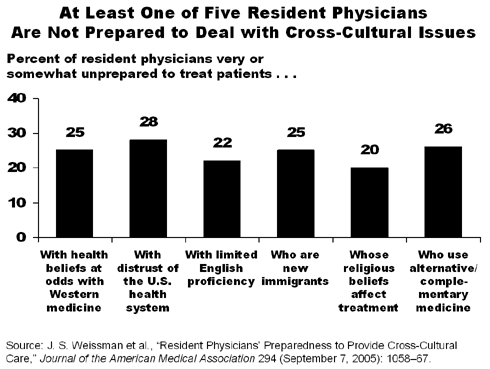Two new Commonwealth Fund–supported studies point to a lack of training for resident physicians in the complexities of providing "culturally competent" medical care in an increasingly diverse society.
In one of the studies, published in the Journal of the American Medical Association and authored by a team of researchers led by Joel S. Weissman, Ph.D., doctors-in-training reported not feeling prepared to provide all patients with "culturally competent" care. Resident Physicians' Preparedness to Provide Cross-Cultural Care notes that about half of residents in their final year of training say they had received little or no training in understanding how to address patients from different cultures, how to identify patient mistrust and understanding relevant religious beliefs, or relevant cultural customs that affect care.
Consequently, more than one of five residents said they were not adequately prepared to treat patients who, for example, have religious beliefs that may affect treatment (20%), use complementary medicine (26%), or are new immigrants (25%).
Focus groups and interviews with residents confirm these findings. According to the other study, Mixed Messages: Residents' Experiences Learning Cross-Cultural Care (Academic Medicine, Sept. 2005), residents feel that cross-cultural care, although endorsed by their training institutions, is a low priority in their curricula due to lack of time and resources. Attending doctors are not likely to evaluate residents on such skills, and hospitals are short on medical interpreters, reports lead author Elyse R. Park, Ph.D.

To treat patients from different cultural backgrounds, residents say they have developed ad-hoc methods, or what the authors describe as "coping behaviors," including visual cues to overcome language barriers.
Both studies conclude that teaching institutions do not allot sufficient time and resources for cross-cultural training. Residents expressed interest in case-based and hands-on approaches that would help them overcome language and cultural barriers and negotiate treatment plans with families. Such an approach to cross-cultural training, the researchers say, could help to address racial and ethnic disparities in care.